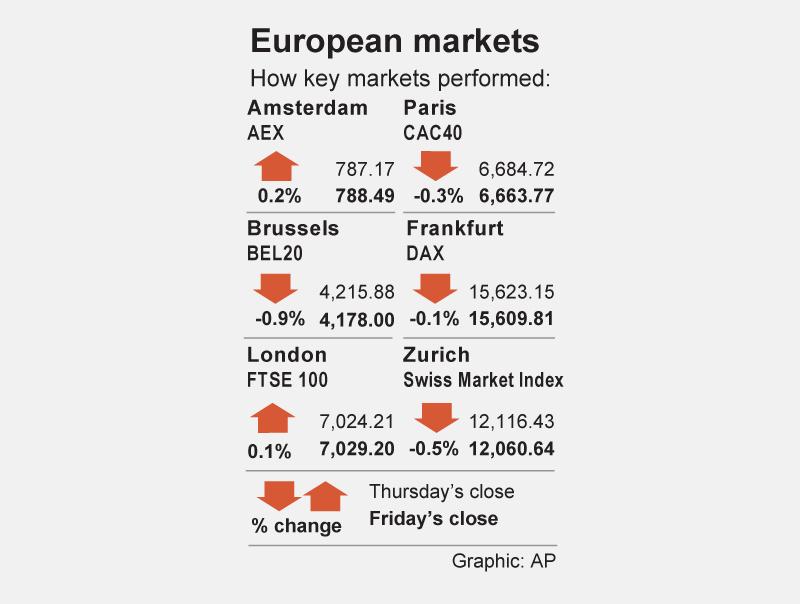European stocks closed lower on Friday, down more than 1 percent this week as investors weighed risks from tighter monetary policies after the European Central Bank (ECB) signaled a slowdown of COVID-19-era bond purchases.
The pan-European STOXX 600 index fell 0.26 percent to 466.34, and dropped for four of five sessions this week to post a weekly decline of 1.19 percent, as worries persisted about a slowing global economic recovery.
Defensive sectors such as healthcare and real estate notched the biggest weekly drops, as investors positioned for a possible increase in economic growth.

News of a call between Chinese President Xi Jinping (習近平) and US President Joe Biden offered some relief to battered Asian stocks, particularly tech companies that have come under heightened regulatory scrutiny in Beijing.
Tech stocks in Europe rose 0.7 percent, while luxury stocks received a boost as France’s LVMH Moet Hennessy Louis Vuitton SE rose 0.8 percent after HSBC Holdings PLC recommended buying the stock.
China-exposed miners were the biggest gainers on the day, up 1.1 percent.
European stocks found support after the ECB said it was not about to close the money taps, despite projecting higher growth and inflation for the eurozone.
“The outcome of the meeting is likely to be supportive in the short term, but even if ECB President Christine Lagarde was cautious in highlighting that the decision was a just a recalibration, a ‘real’ tapering is probably coming next year, provided that economic conditions remain good enough,” UniCredit SpA analysts said.
European shares have hovered below their record highs in the middle of last month on the back of good earnings and recovery prospects, but major money houses are skeptical of further gains, particularly in US stock markets that are home to high-growth companies.
In London, the FTSE 100 ended higher, but posted its worst weekly performance since the middle of last month as data showed the pace of domestic economic recovery stalled in July due to a surge in COVID-19 cases and supply chain disruptions.
The blue-chip index ended 0.07 percent up at 7,029.20, down 1.53 percent from a week earlier, with miners leading the gains.
Economic output rose just 0.1 percent in July, the British Office for National Statistics said, the smallest monthly increase since January when the uK went into a new national lockdown.
“Isolation rules have been relaxed... The vaccination rollout has continued apace and Delta appears to have been kept at bay, at least for now,” AJ Bell financial analyst Danni Hewson said.
“August’s figures will be colored by the bright palate of summer, but September seems to have brought a new term full of old normals,” Hewson added.

KEEPING UP: The acquisition of a cleanroom in Taiwan would enable Micron to increase production in a market where demand continues to outpace supply, a Micron official said Micron Technology Inc has signed a letter of intent to buy a fabrication site in Taiwan from Powerchip Semiconductor Manufacturing Corp (力積電) for US$1.8 billion to expand its production of memory chips. Micron would take control of the P5 site in Miaoli County’s Tongluo Township (銅鑼) and plans to ramp up DRAM production in phases after the transaction closes in the second quarter, the company said in a statement on Saturday. The acquisition includes an existing 12 inch fab cleanroom of 27,871m2 and would further position Micron to address growing global demand for memory solutions, the company said. Micron expects the transaction to

Nvidia Corp’s GB300 platform is expected to account for 70 to 80 percent of global artificial intelligence (AI) server rack shipments this year, while adoption of its next-generation Vera Rubin 200 platform is to gradually gain momentum after the third quarter of the year, TrendForce Corp (集邦科技) said. Servers based on Nvidia’s GB300 chips entered mass production last quarter and they are expected to become the mainstay models for Taiwanese server manufacturers this year, Trendforce analyst Frank Kung (龔明德) said in an interview. This year is expected to be a breakout year for AI servers based on a variety of chips, as

Global semiconductor stocks advanced yesterday, as comments by Nvidia Corp chief executive officer Jensen Huang (黃仁勳) at Davos, Switzerland, helped reinforce investor enthusiasm for artificial intelligence (AI). Samsung Electronics Co gained as much as 5 percent to an all-time high, helping drive South Korea’s benchmark KOSPI above 5,000 for the first time. That came after the Philadelphia Semiconductor Index rose more than 3 percent to a fresh record on Wednesday, with a boost from Nvidia. The gains came amid broad risk-on trade after US President Donald Trump withdrew his threat of tariffs on some European nations over backing for Greenland. Huang further

HSBC Bank Taiwan Ltd (匯豐台灣商銀) and the Taiwan High Prosecutors Office recently signed a memorandum of understanding (MOU) to enhance cooperation on the suspicious transaction analysis mechanism. This landmark agreement makes HSBC the first foreign bank in Taiwan to establish such a partnership with the High Prosecutors Office, underscoring its commitment to active anti-fraud initiatives, financial inclusion, and the “Treating Customers Fairly” principle. Through this deep public-private collaboration, both parties aim to co-create a secure financial ecosystem via early warning detection and precise fraud prevention technologies. At the signing ceremony, HSBC Taiwan CEO and head of banking Adam Chen (陳志堅)